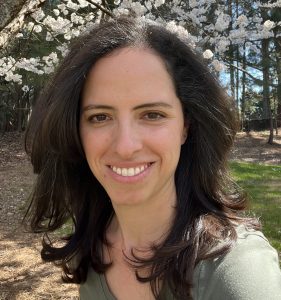 Stefanie Ramos Bierge is a linguist currently serving as a postdoctoral associate at the Institute of Economic Botany at the New York Botanical Garden. Her research expertise lies in the field of language documentation and description, with a specific focus on morphosyntax within Uto-Aztecan languages. She is currently working on an NEH funded project centered around the Wixárika language and local ecological knowledge.
Stefanie Ramos Bierge is a linguist currently serving as a postdoctoral associate at the Institute of Economic Botany at the New York Botanical Garden. Her research expertise lies in the field of language documentation and description, with a specific focus on morphosyntax within Uto-Aztecan languages. She is currently working on an NEH funded project centered around the Wixárika language and local ecological knowledge.
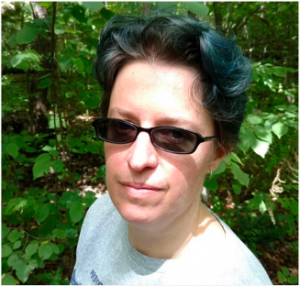 Claire Bowern is professor of Linguistics at Yale University. She is a historical linguist whose research is centered around language change and language documentation in Indigenous Australia. She works with speakers of endangered languages, with archival sound and print materials, and she uses computational and phylogenetic methods. She partners with community organizations in Australia to develop community-based language materials and apps for language learning and teaching. She is currently the editor of the journal Diachronica.
Claire Bowern is professor of Linguistics at Yale University. She is a historical linguist whose research is centered around language change and language documentation in Indigenous Australia. She works with speakers of endangered languages, with archival sound and print materials, and she uses computational and phylogenetic methods. She partners with community organizations in Australia to develop community-based language materials and apps for language learning and teaching. She is currently the editor of the journal Diachronica.
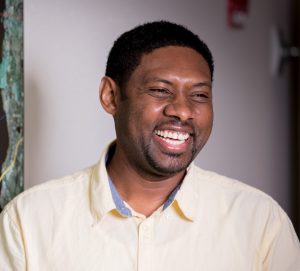 Anthony Ravi Cummings is a native of Guyana, South America, and a geographer and conservationist who focuses his research on the indigenous peoples-influenced landscapes of his home country. Anthony’s work examines maps and the mapping process and how indigenous peoples’ articulation of their landscape realities may inform ‘formal’ maps of landscapes. Through collaborations with three indigenous groups in Guyana, Anthony seeks to understand how indigenous peoples’ cultural processes influence the landscape structure, including the presence of vegetation and wildlife with which they are associated. Anthony has been on the faculty of the School of Economic, Political, and Policy Sciences at the University of Texas at Dallas since fall 2013.
Anthony Ravi Cummings is a native of Guyana, South America, and a geographer and conservationist who focuses his research on the indigenous peoples-influenced landscapes of his home country. Anthony’s work examines maps and the mapping process and how indigenous peoples’ articulation of their landscape realities may inform ‘formal’ maps of landscapes. Through collaborations with three indigenous groups in Guyana, Anthony seeks to understand how indigenous peoples’ cultural processes influence the landscape structure, including the presence of vegetation and wildlife with which they are associated. Anthony has been on the faculty of the School of Economic, Political, and Policy Sciences at the University of Texas at Dallas since fall 2013.
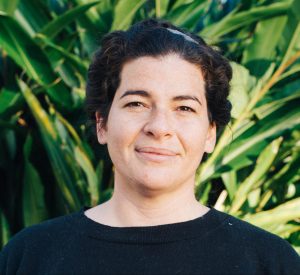 Hali Dardar enjoys developing long-term, creative engagements to improve organizational process and produce community affirming change. Current work includes elements of language revitalization, online communities, volunteer leadership, cultural participation, event production, and community memory. From Louisiana, she is a tribal member of the United Houma Nation and co-founder of the Houma Language Project. She supports process development, community-based service design, and general operations for the Smithsonian Center for Folklife and Cultural Heritage’s Language Vitality Initiative. Prior to joining the Center, she led collaborative project management and design with Shift Design Inc. and the Louisiana Endowment for the Humanities. She holds a BA in print journalism from Louisiana State University and an MA in Arts, Culture, and Media from Rijksuniversiteit.
Hali Dardar enjoys developing long-term, creative engagements to improve organizational process and produce community affirming change. Current work includes elements of language revitalization, online communities, volunteer leadership, cultural participation, event production, and community memory. From Louisiana, she is a tribal member of the United Houma Nation and co-founder of the Houma Language Project. She supports process development, community-based service design, and general operations for the Smithsonian Center for Folklife and Cultural Heritage’s Language Vitality Initiative. Prior to joining the Center, she led collaborative project management and design with Shift Design Inc. and the Louisiana Endowment for the Humanities. She holds a BA in print journalism from Louisiana State University and an MA in Arts, Culture, and Media from Rijksuniversiteit.
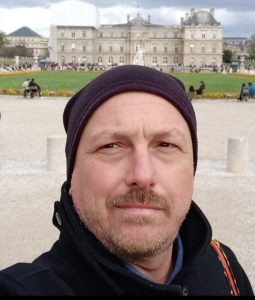 Pierpaolo Di Carlo is a linguist interested in understanding how the nexus between language and culture materializes in both observable linguistic practices and patterns of language change. His fieldwork targeted the documentation of key practices in the reproduction of persistent communities—i.e. the verbal art performances of the Kalasha of northwest Pakistan—and traditional forms of multilingualism in rural Cameroon. Since 2014, he is coordinator of the KPAAM-CAM project (PI Jeff Good). He has co-created multiple collaborative networks connecting researchers, communities, and language activists in Cameroon. These networks lay at the foundations of the virALLanguages initiative (https://virallanguages.org), a volunteer-run project aiming to diffuse accurate information about COVID-19 in marginalized languages that Pierpaolo coordinated during the early phases of the pandemic. He works as Postdoctoral Associate at the Department of Linguistics of the University at Buffalo.
Pierpaolo Di Carlo is a linguist interested in understanding how the nexus between language and culture materializes in both observable linguistic practices and patterns of language change. His fieldwork targeted the documentation of key practices in the reproduction of persistent communities—i.e. the verbal art performances of the Kalasha of northwest Pakistan—and traditional forms of multilingualism in rural Cameroon. Since 2014, he is coordinator of the KPAAM-CAM project (PI Jeff Good). He has co-created multiple collaborative networks connecting researchers, communities, and language activists in Cameroon. These networks lay at the foundations of the virALLanguages initiative (https://virallanguages.org), a volunteer-run project aiming to diffuse accurate information about COVID-19 in marginalized languages that Pierpaolo coordinated during the early phases of the pandemic. He works as Postdoctoral Associate at the Department of Linguistics of the University at Buffalo.
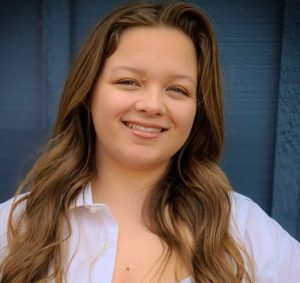 Addie Donelson is a second-year student at Southern Illinois University Edwardsville. She is working towards a bachelor’s degree in Anthropology with a minor in Forensic Sciences and Native American Studies. Addie is a member of the Anthropology Club on campus and is also the secretary of the Epsilon Sigma Alpha chapter at SIUE. This summer she will also be participating in a Biological Anthropology field school where she will learn about excavating human remains.
Addie Donelson is a second-year student at Southern Illinois University Edwardsville. She is working towards a bachelor’s degree in Anthropology with a minor in Forensic Sciences and Native American Studies. Addie is a member of the Anthropology Club on campus and is also the secretary of the Epsilon Sigma Alpha chapter at SIUE. This summer she will also be participating in a Biological Anthropology field school where she will learn about excavating human remains.
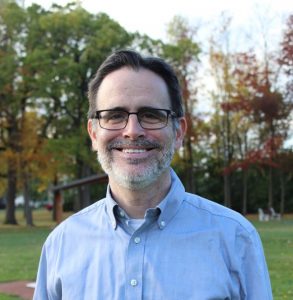 Jeff Good is Professor of Linguistics at the University at Buffalo. His research interests include morphosyntactic typology, the comparative linguistics of the Niger-Congo language family, and the documentation of endangered languages of Cameroon. His documentary work has focused on the languages of the Lower Fungom region of Northwest Cameroon in the context of the project, Key Pluridisciplinary Advances on African Multilingualism–Cameroon (KPAAM-CAM). KPAAM-CAM has involved collaboration with linguists, anthropologists, geographers, and computer scientists based in Cameroon and elsewhere and has recently expanded to other languages in Cameroon. A current focus of KPAAM-CAM is the impact of displacement caused by conflict on the multilingual practices of individuals. The work of KPAAM-CAM (and related preceding work) has been funded by a number of sources, including NSF though the DEL-DLI Program, the Linguistics Program, and the Geography and Spatial Sciences Program.
Jeff Good is Professor of Linguistics at the University at Buffalo. His research interests include morphosyntactic typology, the comparative linguistics of the Niger-Congo language family, and the documentation of endangered languages of Cameroon. His documentary work has focused on the languages of the Lower Fungom region of Northwest Cameroon in the context of the project, Key Pluridisciplinary Advances on African Multilingualism–Cameroon (KPAAM-CAM). KPAAM-CAM has involved collaboration with linguists, anthropologists, geographers, and computer scientists based in Cameroon and elsewhere and has recently expanded to other languages in Cameroon. A current focus of KPAAM-CAM is the impact of displacement caused by conflict on the multilingual practices of individuals. The work of KPAAM-CAM (and related preceding work) has been funded by a number of sources, including NSF though the DEL-DLI Program, the Linguistics Program, and the Geography and Spatial Sciences Program.
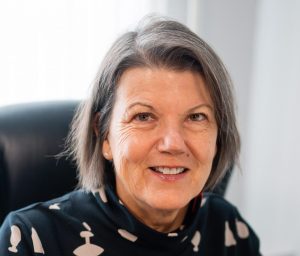 Lenore А. Grenoble is the John Matthews Manly Distinguished Service Professor in the Department of Linguistics at the University of Chicago. She focuses on language contact and shift, vitality and sustainability, documentation and revitalization. Grenoble’s current research brings together linguistic and sociolinguistic factors in contact-induced morphosyntactic change and shift, together with a study of the relationship of climate change, urbanization, language vitality and well-being in Arctic Indigenous communities.
Lenore А. Grenoble is the John Matthews Manly Distinguished Service Professor in the Department of Linguistics at the University of Chicago. She focuses on language contact and shift, vitality and sustainability, documentation and revitalization. Grenoble’s current research brings together linguistic and sociolinguistic factors in contact-induced morphosyntactic change and shift, together with a study of the relationship of climate change, urbanization, language vitality and well-being in Arctic Indigenous communities.
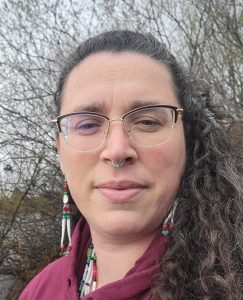 Dr. Jaeci Hall received her Doctorate in Linguistics from the University of Oregon in 2021 with her dissertation titled “Indigenous Methodologies in Linguistics: A case study of Nuu-wee-ya'”. She is a member of the Confederated Tribes of Lower Rogue, an unrecognized tribe from Southern Oregon and is passionate about awakening her language with her family and community. As the current tribal language coordinator for the Coquille Indian Tribe her community has expanded tremendously. With the tribe she advocates for the use of both their ancestral languages, Nuu-wee-ya’ and Miluk, through working with all ages, supporting language learning and continuing archival linguistic research.
Dr. Jaeci Hall received her Doctorate in Linguistics from the University of Oregon in 2021 with her dissertation titled “Indigenous Methodologies in Linguistics: A case study of Nuu-wee-ya'”. She is a member of the Confederated Tribes of Lower Rogue, an unrecognized tribe from Southern Oregon and is passionate about awakening her language with her family and community. As the current tribal language coordinator for the Coquille Indian Tribe her community has expanded tremendously. With the tribe she advocates for the use of both their ancestral languages, Nuu-wee-ya’ and Miluk, through working with all ages, supporting language learning and continuing archival linguistic research.
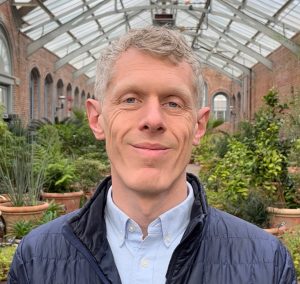 Robbie Hart is an ethnobotanist and ecologist at the Missouri Botanical Garden, where he directs the William L. Brown Center, a team of scientists dedicated to the study of useful plants, understanding the relationships between humans, plants, and their environment, the conservation of plant species, and the preservation of traditional knowledge for the benefit of future generations. His research interests include using natural history collections to answer questions about climate change impacts on plants and people; quantitative ethnobotany; and the ways that environmental information is packaged within vernacular species names and local species concepts.
Robbie Hart is an ethnobotanist and ecologist at the Missouri Botanical Garden, where he directs the William L. Brown Center, a team of scientists dedicated to the study of useful plants, understanding the relationships between humans, plants, and their environment, the conservation of plant species, and the preservation of traditional knowledge for the benefit of future generations. His research interests include using natural history collections to answer questions about climate change impacts on plants and people; quantitative ethnobotany; and the ways that environmental information is packaged within vernacular species names and local species concepts.
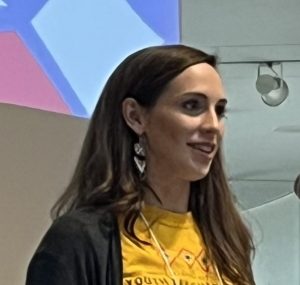 Raina Heaton is an Associate Professor in the Native American Studies department at the University of Oklahoma and the Curator of Native American Languages at the Sam Noble Oklahoma Museum of Natural History. She is also the Director of the annual Oklahoma Native American Youth Language Fair. As a linguist she has over a decade of ongoing work in language documentation and revitalization with Indigenous communities in North, Central, and South America. As a curator she works with the Native communities in Oklahoma and beyond to safeguard important language materials and to create digital solutions for responsible accessibility.
Raina Heaton is an Associate Professor in the Native American Studies department at the University of Oklahoma and the Curator of Native American Languages at the Sam Noble Oklahoma Museum of Natural History. She is also the Director of the annual Oklahoma Native American Youth Language Fair. As a linguist she has over a decade of ongoing work in language documentation and revitalization with Indigenous communities in North, Central, and South America. As a curator she works with the Native communities in Oklahoma and beyond to safeguard important language materials and to create digital solutions for responsible accessibility.
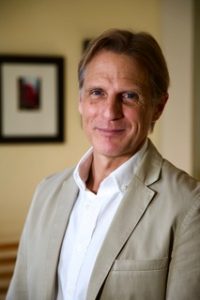 Richard Henne-Ochoa is on the faculty at Indiana University’s College of Arts & Sciences and directs the Institute for Indigenous Knowledge and its Center for the Documentation and Revitalization of Indigenous Languages. His research trajectory began in education, and it has since been grounded in perspectives on social life from linguistic anthropology, sociolinguistics, and sociocultural perspectives on human development. He uses these perspectives to understand education, broadly conceived, in Indigenous schools, families, and communities. Most of his work focuses on Indigenous language and culture reclamation, particularly ways of communicating situated in social and cultural context. This work includes many years of collaboration with members of the Oglala Lakota Nation on Pine Ridge Indian Reservation, and additional work with the Pawnee of Oklahoma and the Arikara of North Dakota.
Richard Henne-Ochoa is on the faculty at Indiana University’s College of Arts & Sciences and directs the Institute for Indigenous Knowledge and its Center for the Documentation and Revitalization of Indigenous Languages. His research trajectory began in education, and it has since been grounded in perspectives on social life from linguistic anthropology, sociolinguistics, and sociocultural perspectives on human development. He uses these perspectives to understand education, broadly conceived, in Indigenous schools, families, and communities. Most of his work focuses on Indigenous language and culture reclamation, particularly ways of communicating situated in social and cultural context. This work includes many years of collaboration with members of the Oglala Lakota Nation on Pine Ridge Indian Reservation, and additional work with the Pawnee of Oklahoma and the Arikara of North Dakota.
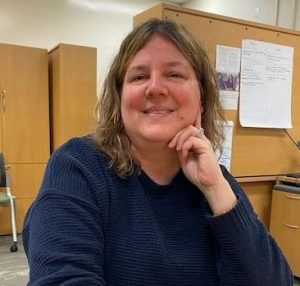 Kristine Hildebrandt is a professor in the Department of English Language and Literature at Southern Illinois University Edwardsville. She has directed multiple projects funded by the National Science Foundation, the National Endowment for the Humanities, and the Social Sciences Research Council, all with convergence initiatives. She collaborated with a GIS Geographer to build an online, multimedia, interactive atlas of language attitudes and practices in the Manang region of Nepal. She also collaborated with an education specialist to investigate language practices in local schools in the Manang region. Hildebrandt partnered with a medical anthropologist and a sociocultural anthropologist to document the lived experiences of survivors of the 2015 Nepal earthquakes, with publications on community participatory field methods. Additionally, Hildebrandt is the co-founder and co-director of the IRIS Digital Humanities Center at SIUE, where projects and pedagogy cross many disciplines.
Kristine Hildebrandt is a professor in the Department of English Language and Literature at Southern Illinois University Edwardsville. She has directed multiple projects funded by the National Science Foundation, the National Endowment for the Humanities, and the Social Sciences Research Council, all with convergence initiatives. She collaborated with a GIS Geographer to build an online, multimedia, interactive atlas of language attitudes and practices in the Manang region of Nepal. She also collaborated with an education specialist to investigate language practices in local schools in the Manang region. Hildebrandt partnered with a medical anthropologist and a sociocultural anthropologist to document the lived experiences of survivors of the 2015 Nepal earthquakes, with publications on community participatory field methods. Additionally, Hildebrandt is the co-founder and co-director of the IRIS Digital Humanities Center at SIUE, where projects and pedagogy cross many disciplines.
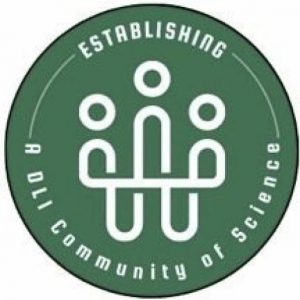 Tracy Hirata-Edds works with Miami Tribe’s language revitalization efforts through the Myaamia Center by supporting language-focused activities, including language learning/teaching methodology and assessment design. She obtained her Ph.D. in Child Language from University of Kansas, master’s degree from Oklahoma State University in Teaching English as a Second Language, and bachelor’s degree in Mathematics Education from Colorado State University.
Tracy Hirata-Edds works with Miami Tribe’s language revitalization efforts through the Myaamia Center by supporting language-focused activities, including language learning/teaching methodology and assessment design. She obtained her Ph.D. in Child Language from University of Kansas, master’s degree from Oklahoma State University in Teaching English as a Second Language, and bachelor’s degree in Mathematics Education from Colorado State University.
Tracy taught ESL courses and provided teacher training at the University of Kansas’ Applied English Center for 15 years and at Emporia State University’s Intensive English Program for 10 years. She served as a Peace Corps Volunteer and Fulbright Scholar in Nepal. She partners with Native communities to enhance opportunities for culture/language maintenance and revitalization, curriculum and assessment design, teacher training, lesson and materials development, and children’s first and second language acquisition. She previously worked as a consultant to Cherokee Nation’s Language Revitalization Program. Additionally, she supports revitalization efforts through publications, workshops, research, and teacher trainings in various contexts, including with Oklahoma Breath of Life and CoLang.
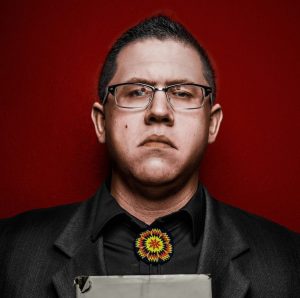 Lokosh (Joshua D. Hinson, PhD) is a Chikashsha language revivalist and executive officer of the division of language preservation for the Chickasaw Nation. Lokosh is a citizen of the Chickasaw Nation, of the Imatapo (Their-Lean-To People) house group and Kowishtoꞌ Iksaꞌ (Panther Clan). He holds a PhD from the University of Oklahoma in Native Language Revitalization. He resides on the Chickasaw Nation reservation in Ada, Oklahoma.
Lokosh (Joshua D. Hinson, PhD) is a Chikashsha language revivalist and executive officer of the division of language preservation for the Chickasaw Nation. Lokosh is a citizen of the Chickasaw Nation, of the Imatapo (Their-Lean-To People) house group and Kowishtoꞌ Iksaꞌ (Panther Clan). He holds a PhD from the University of Oklahoma in Native Language Revitalization. He resides on the Chickasaw Nation reservation in Ada, Oklahoma.
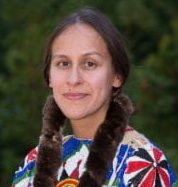 Michelle M. Jacob is an enrolled member of the Yakama Nation and is Professor of Indigenous Studies and Director of the Sapsik’ʷałá (Teacher) Education Program in the Department of Education Studies at the University of Oregon. Michelle also serves as Affiliated Faculty in the Department of Indigenous, Race, and Ethnic Studies, and Affiliated Faculty in the Environmental Studies Program. Michelle engages in scholarly and activist work that seeks to understand and work toward a holistic sense of health and well-being within Indigenous communities and among allies who wish to engage decolonization. Michelle’s personal website is: http://anahuymentoring.com
Michelle M. Jacob is an enrolled member of the Yakama Nation and is Professor of Indigenous Studies and Director of the Sapsik’ʷałá (Teacher) Education Program in the Department of Education Studies at the University of Oregon. Michelle also serves as Affiliated Faculty in the Department of Indigenous, Race, and Ethnic Studies, and Affiliated Faculty in the Environmental Studies Program. Michelle engages in scholarly and activist work that seeks to understand and work toward a holistic sense of health and well-being within Indigenous communities and among allies who wish to engage decolonization. Michelle’s personal website is: http://anahuymentoring.com
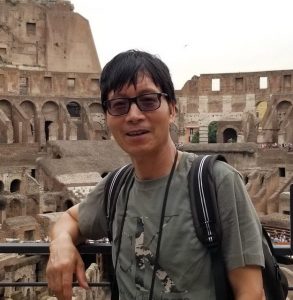 Dr. Shunfu Hu, Professor of Geography and GIS, Southern Illinois University Edwardsville. Dr. Hu’s primary research is in the area of multimedia mapping (online maps linked to multimedia information, such as descriptive text, digital photographs, digital audio sound and video) and map animation. During 2012-2017, Dr. Hu had the opportunity to participate in Dr. Kristine Hildebrandt’s NSF-funded Early Career research project titled “Documenting the Languages of Manang, Nepal for Local and International Impact.” For more information about Dr. Hu’s research interests, please visit https://www.siue.edu/~shu/research.html.
Dr. Shunfu Hu, Professor of Geography and GIS, Southern Illinois University Edwardsville. Dr. Hu’s primary research is in the area of multimedia mapping (online maps linked to multimedia information, such as descriptive text, digital photographs, digital audio sound and video) and map animation. During 2012-2017, Dr. Hu had the opportunity to participate in Dr. Kristine Hildebrandt’s NSF-funded Early Career research project titled “Documenting the Languages of Manang, Nepal for Local and International Impact.” For more information about Dr. Hu’s research interests, please visit https://www.siue.edu/~shu/research.html.
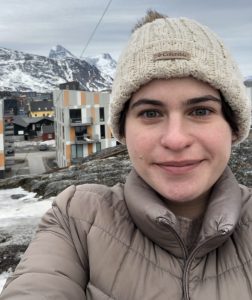
Jessica Kantarovich is a linguist specializing in language variation and change in situations of language contact and endangerment, with a particular focus on the minoritized speakers in these contexts, including heritage speakers, shifting speakers, and new learners of endangered languages. She is committed to studying Indigenous languages of the Arctic and understanding the typological, cognitive, and sociolinguistic factors that shape bilingual grammars and linguistic practices in Arctic contact ecologies. She has been working with speakers of Chukchi (Chukotko-Kamchatkan) and Sakha (Turkic) since 2017 and has recently begun working in Greenland. She also works with local scholars in Greenland and Siberia to address linguistic questions that are most pressing for their communities, such as those that may inform action around the social status of the languages, promoting language acquisition and revitalization, and capacity building of speaker-driven linguistic research. Beginning in August 2023, she will be an Assistant Professor in the Department of Linguistics at the Ohio State University.
Website: https://home.uchicago.edu/~jkantarovich/
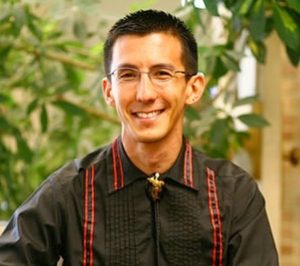 Wesley Y. Leonard (he/him) is a citizen of the Miami Tribe of Oklahoma and an associate professor of Native American Studies in the Ethnic Studies department at the University of California, Riverside. Drawing from his training in linguistics and experience in community-based language programs, he works to build capacity for Native American language reclamation, which he conceptualizes as a community-driven and decolonial form of language work that includes but goes beyond what is widely referred to as language revitalization. He also co-developed the Natives4Linguistics project, which promotes Native American research protocols and intellectual tools for doing linguistic science, and which began through a DLI-DEL funded workshop (NSF grant no. 1743743)
Wesley Y. Leonard (he/him) is a citizen of the Miami Tribe of Oklahoma and an associate professor of Native American Studies in the Ethnic Studies department at the University of California, Riverside. Drawing from his training in linguistics and experience in community-based language programs, he works to build capacity for Native American language reclamation, which he conceptualizes as a community-driven and decolonial form of language work that includes but goes beyond what is widely referred to as language revitalization. He also co-developed the Natives4Linguistics project, which promotes Native American research protocols and intellectual tools for doing linguistic science, and which began through a DLI-DEL funded workshop (NSF grant no. 1743743)
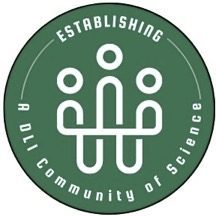 Robert E. Lewis Jr is a member of the Citizen Potawatomi Nation. Dr. Lewis has studied Potawatomi since 2007. Dr. Lewis received his BA in Linguistics from the University of Kansas in 2011, his MA in Linguistics from the University of Kansas in 2013, and his PhD in Linguistics in 2020. Dr. Lewis is also a founding member and the Secretary-Treasurer of the Wisconsin based nonprofit Bodwéwadmimwen Ėthë ték, Inc. (The Center for Potawatomi Language).
Robert E. Lewis Jr is a member of the Citizen Potawatomi Nation. Dr. Lewis has studied Potawatomi since 2007. Dr. Lewis received his BA in Linguistics from the University of Kansas in 2011, his MA in Linguistics from the University of Kansas in 2013, and his PhD in Linguistics in 2020. Dr. Lewis is also a founding member and the Secretary-Treasurer of the Wisconsin based nonprofit Bodwéwadmimwen Ėthë ték, Inc. (The Center for Potawatomi Language).
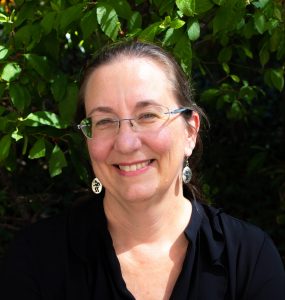 Mary S. Linn is the Curator of Language and Cultural Vitality at the Smithsonian Center for Folklife and Cultural Heritage. Her primary research is in effective grassroots strategies in language reclamation and cultural sustainability, especially in small and minoritized language communities. She is director of the Language Vitality Initiative that focuses on collaborative language research, training communities in language and cultural documentation, approaches to language revitalization, and evaluating impact of grassroots language revitalization efforts. She directed the Sustaining Minoritised Languages of Europe (SMiLE) research program from 2016-2019 and is the co-director of the Sino-Tibetan Language and Linguistic Research Methodology Workshop at Nankai University. She is on the curatorial committee of the Smithsonian Mother Tongue Film Festival and a member of the Shared Stewardship Working Group at the Center. Before coming to the Smithsonian, she was associate professor of linguistic anthropology at the University of Oklahoma and was the founding curator of Native American Languages, a collection and research department at the Sam Noble Oklahoma Museum of Natural History, where she initiated and directed the Native American Youth Language Fair and the Oklahoma Breath of Life Workshop. Mary holds a PhD in linguistics from the University of Kansas.
Mary S. Linn is the Curator of Language and Cultural Vitality at the Smithsonian Center for Folklife and Cultural Heritage. Her primary research is in effective grassroots strategies in language reclamation and cultural sustainability, especially in small and minoritized language communities. She is director of the Language Vitality Initiative that focuses on collaborative language research, training communities in language and cultural documentation, approaches to language revitalization, and evaluating impact of grassroots language revitalization efforts. She directed the Sustaining Minoritised Languages of Europe (SMiLE) research program from 2016-2019 and is the co-director of the Sino-Tibetan Language and Linguistic Research Methodology Workshop at Nankai University. She is on the curatorial committee of the Smithsonian Mother Tongue Film Festival and a member of the Shared Stewardship Working Group at the Center. Before coming to the Smithsonian, she was associate professor of linguistic anthropology at the University of Oklahoma and was the founding curator of Native American Languages, a collection and research department at the Sam Noble Oklahoma Museum of Natural History, where she initiated and directed the Native American Youth Language Fair and the Oklahoma Breath of Life Workshop. Mary holds a PhD in linguistics from the University of Kansas.
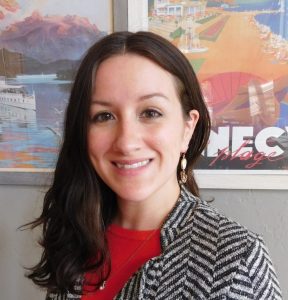 Juliet Morgan is currently the senior manager linguist for the Chickasaw Nation Division of Language Preservation. She has a PhD in socio-cultural and linguistic anthropology from the University of Oklahoma. Her current work includes creating curriculum and assessment tools for the adult immersion program and further documenting the grammar of both Native speakers and second language speakers. She has been a part of the development team for Rosetta Stone Chickasaw since 2015. Her research focuses on morphology, acquisition, and online indigenous language learning.
Juliet Morgan is currently the senior manager linguist for the Chickasaw Nation Division of Language Preservation. She has a PhD in socio-cultural and linguistic anthropology from the University of Oklahoma. Her current work includes creating curriculum and assessment tools for the adult immersion program and further documenting the grammar of both Native speakers and second language speakers. She has been a part of the development team for Rosetta Stone Chickasaw since 2015. Her research focuses on morphology, acquisition, and online indigenous language learning.
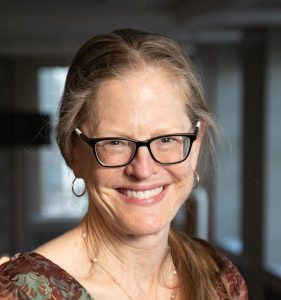 Bonnie Pitblado, PhD, is an archaeologist and the Robert E and Virginia Bell Endowed Chair of Anthropological Archaeology at the University of Oklahoma. She also founded and directs the Oklahoma Public Archaeology Network (OKPAN), an organization that seeks to create conversations and knowledge-exchange among the many communities in Oklahoma who share an interest in our state’s heritage. Bonnie completed her graduate work at the University of Arizona in 1999 and joined the OU faculty in 2012, founding OKPAN in 2016. Her major research interests include the Ice Age peopling of the Western Hemisphere, the earliest human use of the Rocky Mountains, public-facing “outreach” archaeology, community-engaged archaeology, and “structure-busting” in universities.
Bonnie Pitblado, PhD, is an archaeologist and the Robert E and Virginia Bell Endowed Chair of Anthropological Archaeology at the University of Oklahoma. She also founded and directs the Oklahoma Public Archaeology Network (OKPAN), an organization that seeks to create conversations and knowledge-exchange among the many communities in Oklahoma who share an interest in our state’s heritage. Bonnie completed her graduate work at the University of Arizona in 1999 and joined the OU faculty in 2012, founding OKPAN in 2016. Her major research interests include the Ice Age peopling of the Western Hemisphere, the earliest human use of the Rocky Mountains, public-facing “outreach” archaeology, community-engaged archaeology, and “structure-busting” in universities.
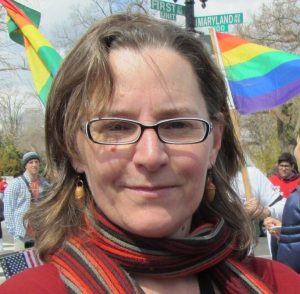
Ruth Rouvier is the Native American Scholars Initiative Engagement Coordinator at the American Philosophical Society’s Center for Native American and Indigenous Research (CNAIR). A linguist by training, her research examines the linguistic, social, and cultural aspects of language endangerment and resilience, with a focus on languages of North and Central America. She has worked with Indigenous communities in support of language and cultural sustainability for over 20 years, as an academic researcher and in professional roles with the Smithsonian’s National Museum of Natural History, the Office of Head Start, and the Karuk Tribe.
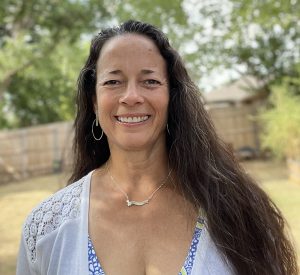
Racquel-María Sapién in addition to her appointment as an Associate Professor at the University of Oklahoma, she is the Editor of Language Documentation & Conservation (LD&C). She works primarily with users and heritage learners of languages that have fallen out of regular use due to both voluntary and involuntary shifts. Her interest is in supporting work to reclaim spaces for languages that have been minoritized. Her research foci include developing methodologies that are inclusive of community members who have a vested interest in work with their languages, as well as analyses of synchronic patterns of morphosyntax that incorporate functionalist and diachronic perspectives. She works in collaboration with members of Kari’nja (Cariban) and Lokono (Arawakan) communities in Suriname to document, analyze, and support the reclamation of these and other languages. In addition to mentoring OU students working with their own heritage languages, she has taught at institutes such as the Northwest Indian Language Institute (NILI) at the University of Oregon, the Institute on Collaborative Language Research (CoLang), and the Oklahoma Breath of Life, all with a goal of supporting language work of all kinds.
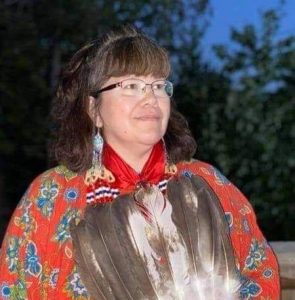 Patricia Saulis, Wolastoqwiyik/Maliseet, is a Two Eyed Seeing Practitioner and Advisor that seeks to implement the approach of using the best of Indigenous Knowledge systems and western knowledge systems to converge perspectives that will elevate the understanding and ability to innovate and address what is occurring in our natural environment. Also, Patricia is seeking to protect and retain Indigenous ways of knowing and being, Patricia promotes Indigenous language preservation, revitalization and rematriation.
Patricia Saulis, Wolastoqwiyik/Maliseet, is a Two Eyed Seeing Practitioner and Advisor that seeks to implement the approach of using the best of Indigenous Knowledge systems and western knowledge systems to converge perspectives that will elevate the understanding and ability to innovate and address what is occurring in our natural environment. Also, Patricia is seeking to protect and retain Indigenous ways of knowing and being, Patricia promotes Indigenous language preservation, revitalization and rematriation.
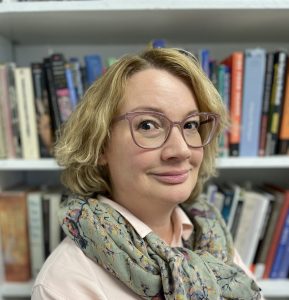 Robin Shoaps is an Associate Professor of Anthropology and Linguistics at the University of Alaska Fairbanks. She is a linguistic and cultural anthropologist who combines field linguistics with ethnographic and discourse analytic methods to investigate the language and culture nexus in naturally-occurring talk. Her longest standing area of research expertise is conservative political media in the US, which, in graduate school, ignited an interest in moral stance taking and entextualization. She has been doing fieldwork in Guatemala since 1995, primarily with Tujaal Tziij (Sakapultek) and K’iche’ Maya peoples, where she has investigated stance-taking in ritual language (folk Catholic and evangelical Christian) and everyday talk. Since moving to UAF in 2012, she has conducted ethnographic and discourse analytic research with Alaska dog mushers and started studying spoken Gwich’in (Dene). Her newest research project seeks to situate facial gestures in the communicative encoding of stance.
Robin Shoaps is an Associate Professor of Anthropology and Linguistics at the University of Alaska Fairbanks. She is a linguistic and cultural anthropologist who combines field linguistics with ethnographic and discourse analytic methods to investigate the language and culture nexus in naturally-occurring talk. Her longest standing area of research expertise is conservative political media in the US, which, in graduate school, ignited an interest in moral stance taking and entextualization. She has been doing fieldwork in Guatemala since 1995, primarily with Tujaal Tziij (Sakapultek) and K’iche’ Maya peoples, where she has investigated stance-taking in ritual language (folk Catholic and evangelical Christian) and everyday talk. Since moving to UAF in 2012, she has conducted ethnographic and discourse analytic research with Alaska dog mushers and started studying spoken Gwich’in (Dene). Her newest research project seeks to situate facial gestures in the communicative encoding of stance.
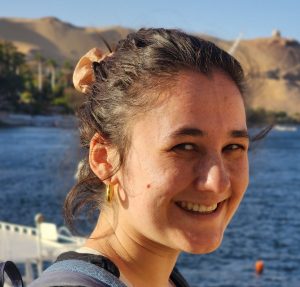
Madeline Snigaroff is a third-year Ph.D. student at The University of Chicago broadly interested in syntax, semantics, Arctic languages, and language revitalization. She has been involved in fieldwork with her own heritage language, Aleut, as well as with Samoan, Toba Batak, and English. Madeline did her undergraduate at Stanford University, where she wrote an Honors Thesis on creating pedagogical materials specialized for a critically endangered language (Aleut), advised by Paul Kiparsky. She has since written about syntactic word formation in Western Aleut, and is currently working on a project on the semantics of the Western Samoan article system. Madeline is passionate about working with the speakers of understudied and underdocumented languages, as she believes they have many untapped insights that can shape the field. Her website is: https://mksnigaroff.github.io/
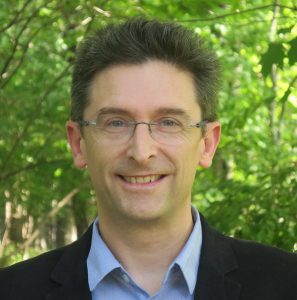 David Stringer is an Associate Professor in the Department of Second Language Studies at Indiana University, Bloomington. His main research areas are language acquisition, bilingualism, and environmental linguistics, with a focus on lexical semantics and syntax. This work encompasses questions relating to language attrition, language maintenance, and traditional ecological knowledge in contexts of biocultural diversity conservation.
David Stringer is an Associate Professor in the Department of Second Language Studies at Indiana University, Bloomington. His main research areas are language acquisition, bilingualism, and environmental linguistics, with a focus on lexical semantics and syntax. This work encompasses questions relating to language attrition, language maintenance, and traditional ecological knowledge in contexts of biocultural diversity conservation.
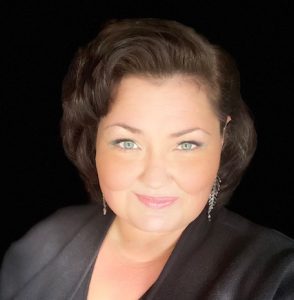
Wendy F. K’ah Skaahluwaa Todd, Ph.D. is Alaska Native Haida of the Sáangaahl ‘Láanaas Sdast’as clan (Fish egg house). Dr. Todd is a Dr. Howard Highholt Endowed Professor at the University of Minnesota Duluth and holds a joint appointment in the Departments of American Indian Studies and Earth & Environmental Sciences. Dr. Todd has a dual Ph.D. in estuary – ocean systems and environmental science and engineering from Oregon Health & Sciences University in Portland, OR. Her geoscience research focuses on examining microbial ecology and diversity, biogeochemistry, and biomineralization in groundwaters. In addition, she conducts social science research and diversity professional development for STEM professionals and federal agencies. In 2021 she founded the Indigenous Geoscience Community, as a sustainable community of Indigenous geoscientists to come together to share knowledge using a relational framework, such that Traditional and Western knowledge systems can be expressed within culturally specific protocols without disciplinary boundaries. She is a co-founder of the Indigenous Women’s Water Sisterhood in Duluth, Minnesota, to provide knowledge about the Indigenous history of Minnesota and Lake Superior, the importance of water, and Indigenous women’s role as water protectors. Over the last 20 years she has partnered with her tribal community founding The Geoscience Education Program working to couple STEM and Traditional Knowledge incorporating language and cultural values. She serves on the Board of Directors for the Xáadas Kil Kuyaas Foundation a 501 (C)3 whose mission is to promote, preserve, and perpetuate the highly endangered Northern Haida language.
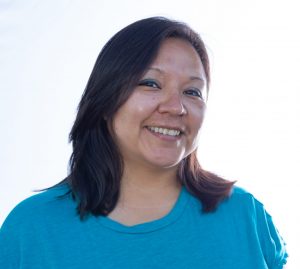 Adrienne Tsikewa, Zuni Pueblo, is currently a PhD candidate in Linguistics at the University of California, Santa Barbara. She is involved with Natives4Linguistics, a collaborative project that promotes Indigenous needs and intellectual tools as ways of doing linguistic science. She served as the convener for the newly formed Native4Linguistics Special Interest Group (under the Linguistic Society of America) from its inception in 2019 until January 2022. She is also a current co-convenor of the CoLang Advisory Circle. She earned an MA in Native American Languages and Linguistics (NAMA) from the University of Arizona in 2013. Her research interests include language documentation and description, language reclamation, language maintenance/revitalization, sociocultural and applied linguistics, language ideologies, family language practices, bilingualism and code-switching, Indigenous research methodologies and Indigenous data sovereignty.
Adrienne Tsikewa, Zuni Pueblo, is currently a PhD candidate in Linguistics at the University of California, Santa Barbara. She is involved with Natives4Linguistics, a collaborative project that promotes Indigenous needs and intellectual tools as ways of doing linguistic science. She served as the convener for the newly formed Native4Linguistics Special Interest Group (under the Linguistic Society of America) from its inception in 2019 until January 2022. She is also a current co-convenor of the CoLang Advisory Circle. She earned an MA in Native American Languages and Linguistics (NAMA) from the University of Arizona in 2013. Her research interests include language documentation and description, language reclamation, language maintenance/revitalization, sociocultural and applied linguistics, language ideologies, family language practices, bilingualism and code-switching, Indigenous research methodologies and Indigenous data sovereignty.
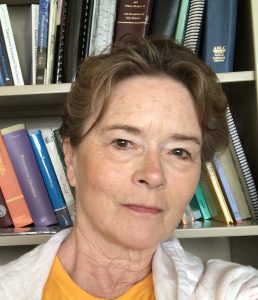
Siri Tuttle has been studying the languages of the Dene (Athabaskan) family for over thirty years. From 2003-2021, she served as faculty at the Alaska Native Language Center at the University of Alaska Fairbanks, serving as Director of the Alaska Native Archive at UAF 2016-2018, and as Director of the Alaska Native Language Center from 2018-2021. Currently she serves as Professor of Navajo Linguistics at Navajo Technical University in Crownpoint, New Mexico. Her publications include studies of speech sounds, morphology, syntax and verbal art, all within the context of extreme language endangerment. Working under the direction of Dene elders in Alaska, she extended her linguistic work to include the study of song, which has led to a productive partnership with musicologist Håkan Lundström.
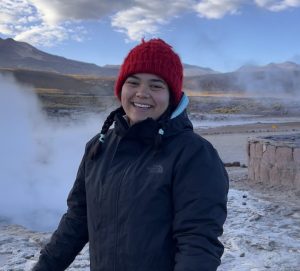
Suraya Yamada-Sapien is a third-year student at the University of Oklahoma. She is completing an accelerated program with a Bachelor’s in Environmental Sustainability/Minor in Women’s and Gender Studies and a Master’s in Regional & City Planning on a 4+1 track. Suraya also volunteers for the Oklahoma Department of Health’s Youth Action Subcommittee promoting violence prevention through education and empowerment initiatives for Oklahoma youth. Her academic areas of interest include geographic mapping (GIS), climate adaptation, environmental racism, and green space development. After graduation, Suraya aims to work in regional & city planning in order to build more equitable and ecologically sustainable communities.
